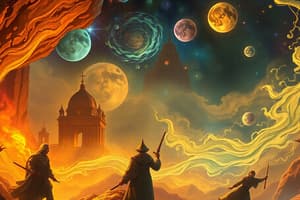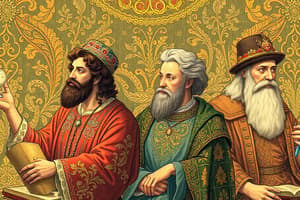Podcast
Questions and Answers
What time period does the term '16-17' signify in the context of the scientific revolution?
What time period does the term '16-17' signify in the context of the scientific revolution?
- The peak period of the scientific revolution
- The start of the scientific revolution (correct)
- The end of the scientific revolution
- The period of Renaissance
According to the content, what does the term 'Panahong Enlightenment' represent?
According to the content, what does the term 'Panahong Enlightenment' represent?
- A philosophical movement (correct)
- A period of religious revival
- A scientific revolution
- A political revolution
Which of these figures is associated with the explanation that the planets orbit in elliptical paths?
Which of these figures is associated with the explanation that the planets orbit in elliptical paths?
- Johannes Kepler (correct)
- Nicolaus Copernicus
- John Locke
- Thomas Hobbes
What is the main belief about human nature that distinguishes Thomas Hobbes from John Locke?
What is the main belief about human nature that distinguishes Thomas Hobbes from John Locke?
What is the significance of the term 'Scientia' in relation to the Scientific Revolution?
What is the significance of the term 'Scientia' in relation to the Scientific Revolution?
Flashcards
Scientific Revolution
Scientific Revolution
A period in the 16th to 17th century marked by major scientific discoveries.
Nicolaus Copernicus
Nicolaus Copernicus
Astronomer who proposed that the Earth is round and revolves around the Sun.
Johannes Kepler
Johannes Kepler
Scientist known for his laws of planetary motion, stating that planets have elliptical orbits.
Thomas Hobbes
Thomas Hobbes
Signup and view all the flashcards
John Locke
John Locke
Signup and view all the flashcards
Study Notes
Scientific Revolution
- Period of significant changes in science (16th-17th centuries).
- Key figures
- Nicolaus Copernicus: Proposed a heliocentric model of the solar system.
- Johannes Kepler: Showed planetary orbits are elliptical.
Enlightenment
- Period of philosophical movement in Europe (mid-18th century).
- Characterized by:
- Emphasis on reason and individualism.
- Focus on human rights.
- Emphasis on Natural Law.
- Influenced by scientific revolution
Political Thought
- Thomas Hobbes:
- Argued that humans are inherently self-interested and require strong government to prevent chaos.
- Wrote Leviathan, a foundational text about political philosophy.
- John Locke:
- Believed humans possess natural rights (life, liberty, property).
- Argued government's role is to protect these rights.
- His ideas influenced the Enlightenment and American Revolution.
Studying That Suits You
Use AI to generate personalized quizzes and flashcards to suit your learning preferences.



